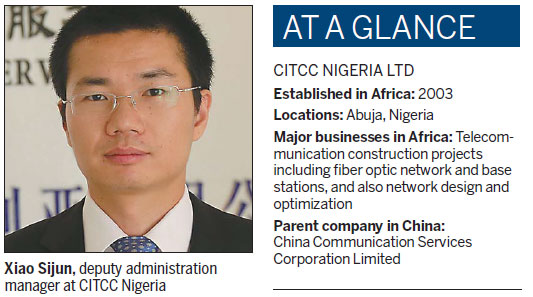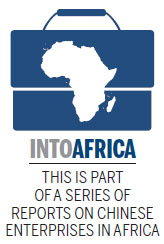|
Employees of China International Telecommunication Construction Corporation Nigeria Ltd install fiber optic cable. Provided to China Daily |

Fiber operator sees its Nigerian operation change dramatically in just a decade
Being fleet of foot and able to change direction quickly can often be the difference between success and failure in the telecommunications businesses.
Such is the case for a Chinese company that arrived in Nigeria in 2003 and has had to adapt and change as the local industry has developed and matured.
China International Telecommunication Construction Corporation Nigeria Ltd's first contract was to build an agricultural microwave transmission network, worth more than $10 million, in the southeast of the country, but quickly officials realized that to seriously compete in what was a quickly changing market, they had to change tack.
Xiao Sijun, deputy administration manager at CITCC Nigeria, says it is now offering more comprehensive telecommunications services to local customers, and apart from construction work, it is also providing consulting and design advice to clients who often need more tailored services than before.
But as with many foreign operators in Nigeria, and across the continent, CITCC's success has not only been about adapting its service, but also its workforce.
It has invested heavily in not only employing local staff, but also in thoroughly training them.
However, Xiao says measuring the success of this localization and skills transfer in Africa is tricky.

"Localization is a mission. Although language and culture are barriers, maybe more so compared with Indian or Lebanon, for instance where we also work, we have had to make conspicuous progress in both since our entry here in 2003."
At the start, the company depended on Chinese staff but Xiao's biggest challenge has been to replace them with a qualified local workforce.
Its first project in Nigeria, in collaboration with Huawei, the Chinese publicly listed global provider of telecom equipment and network solutions, was to build a fiber optic network among major cities in Nigeria with a total length of 3,500 kilometers and contract value of $10 million.
But due to a lack of local employees, it had to establish two project bases and bring in 40 Chinese in a 150-kilometer sub-project between the country's largest city, Lagos and Ibadan.
"Now the number of Chinese has been reduced to two for the same workload, which has greatly reduced our costs and security threats, and of course created a lot more jobs for local people."
The key to making that progress was to offer consistent support and to transfer skills between its Chinese and local employees, "but that had to be gradual, not rushed", Xiao says.
For instance, in its construction the company uses a specific technique called splicing fiber, which means joining two fiber optic cables together.
Any company using fiber optics will have trained technicians that are knowledgeable in how to correctly splice these intricate cables, and since this can be an expensive repair, knowledge and experience are a must.
"Local employees could not understand the skills at the time, but now the work is all done by local staff," he says.
"They have developed by working and learning at the same time."
This training of staff has been crucial as the company's business has changed in Nigeria.
After that initial $10 million transmission contract in 2003, CITCC's main business in the country is now in two parts: fiber optic networks and base stations.
It has previously worked with different equipment providers and telecom operators, but since being incorporated into China Communication Services Limited in 2008, it has been providing more comprehensive telecom services to local customers.
"Back in China our partners include the biggest telecom operators such as China Telecom and China Mobile, and we have now consolidated China Communication Services' operation and our own overseas businesses, which is more advantageous.
"Familiarity with local conditions is a natural advantage of having skilled local employees, as well as cost. Because the scope of our construction activity is huge, having workers who know the topographical conditions, for example, or those who are familiar with the transport system, is a great asset."
The skills needed in building signal towers and base stations in remote areas can be different from those needed to build a road or bridge in an urban area.
CITCC's work in Africa also includes projects in Algeria and Tanzania, where its engineers also had to deal with sometimes remote locations, such as in deserts.
"There could be health or security issues to deal with," Xiao says.
Working in this particularly fast-changing sector has allowed him to witness the rapid pace of change across the country in general, he says. When he first arrived in Nigeria, telecommunication signals were extremely weak and connections between villages and the cities were poor.
"At the very beginning our business was more about wireless microwave projects, which required simpler technology and construction, and so they were far cheaper than building a fiber network.
"But Nigeria's development over the past decade has been so fast that wireless microwave technology is now outdated and installing fiber is the only way of keeping up with the pace of expansion."
The design of fiber optic networks starts with identifying the best route between two specific locations and then constructing and realigning various sites along the route.
In Nigeria, that can often mean not only negotiating tricky geographic conditions but also taking complicated land ownership into consideration.
"That's because, unlike in China, where the roads and other land around a project would generally belong to the government, there is a lot of private land in Nigeria.
"So sometimes when we need to change a route or location onto private land, we might have to start some very tough negotiation with both the landowner and the local government.
"Although that's normally a job for the contractor or owner, we often have to do this by ourselves, just to ensure efficiency."
To maximize profits, and to grow its work in Nigeria, CITCC found itself having to adapt quickly.
Its initial strategy of being merely a subcontractor was abandoned and it now finds itself as a general contractor dealing with major local telecom operators such as MTN and Etisalat.
Xiao says that in addition to fiber optic networks the major cities, its projects are spreading into major suburbs and satellite towns, of cities such as Lagos and Ibadan in the south of the country, and Katsina and Kano in the north.
Competition from local companies and other foreign companies is becoming fiercer, especially on cost, putting pressure on CITCC's financing and efficiency models, he says.
"But if we continue localizing, I am confident our costs wouldn't be challenged by our competitors."
(China Daily Africa Weekly?07/04/2014 page22)
